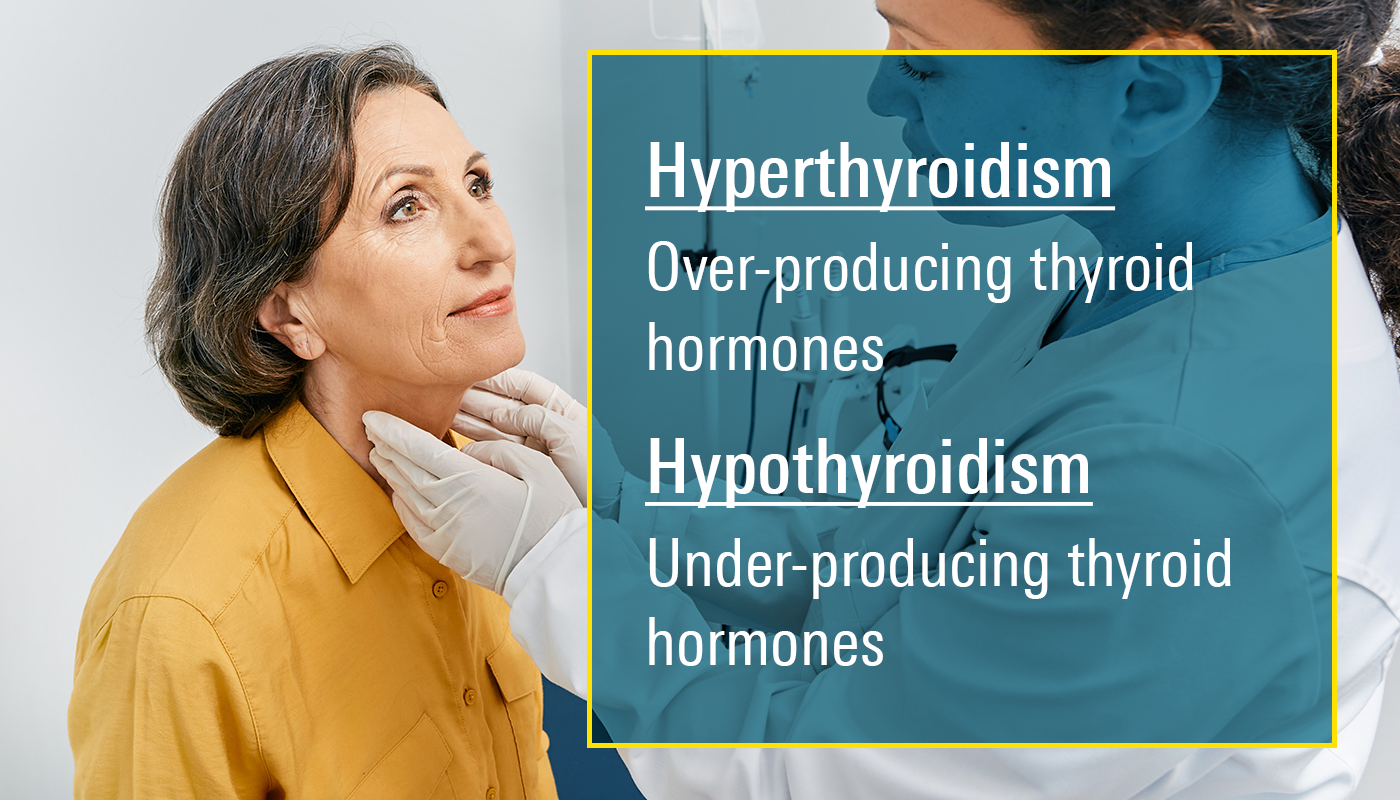Know your Thyroid
January is Thyroid Awareness Month, a time dedicated to recognizing and educating people on some important thyroid-related health conditions that very few people are aware of.
It is estimated that close to 20 million Americans have some form of thyroid disease, with roughly 60% of them being undiagnosed. This is because many of the symptoms associated with thyroid disease can be hard to differentiate from other issues we may be experiencing.
Undiagnosed thyroid disease may put you at risk for certain conditions such as:
- cardiovascular disease
- osteoporosis
- infertility
Therefore, it is important to get an annual check-up done by your healthcare provider.
Importance of the thyroid gland
The thyroid is a hormone-producing gland located at the lower front area of your neck. Its job is to take the iodine consumed in our diets and use it to create hormones that are subsequently released into our bloodstream.
These thyroid hormones play an important role in our energy consumption, they control our metabolism, they help regulate important functions in our bodies such as growth and development, and they increase our heart rate. The thyroid gland is constantly releasing a steady amount of these hormones into our bodies, and maintaining a constant level is important for normal mental health and physical activity.
Ingestion of iodine through our diets is also very important because our body cannot produce it on its own, which may lead to a deficiency in the production of these hormones. For this reason, iodized table salt was introduced for sale in 1924 to ensure that this essential mineral was easily available to everyone.
A lack of iodine in the diet will cause the thyroid gland to grow larger than normal in order to compensate for the deficiency, resulting in a large lump in the throat known as a goiter. Goiters are one of the most recognized signs of a thyroid-related disorder.
Conditions of the thyroid gland

There are two primary medical conditions that can occur when the thyroid gland is not producing hormones at the appropriate levels:
- Hyperthyroidism: when the thyroid gland is over-producing hormones
- Hypothyroidism: when the thyroid gland is not producing enough hormones
Both of these hormonal imbalances can lead to a large number of disease symptoms.
Hyperthyroidism
The most common cause of hyperthyroidism is a condition known as Graves’ disease, an autoimmune disorder where antibodies in the blood “turn on” the thyroid causing it to increase in size and secrete increased levels of hormones. Increased hormone production can also be stimulated by the presence of nodules or lumps on the thyroid gland that grow and increase their output activity, resulting in the production of a goiter. Symptoms of hyperthyroidism include:
- Increased heart rate
- Insomnia
- Weight loss with increased appetite
- Muscle weakness
- Heat intolerance
Hypothyroidism
The most common cause of hypothyroidism is another autoimmune disorder known as Hashimoto’s thyroiditis that causes antibodies produced by the body to attack and damage the thyroid gland. Other causes include radiation therapy for treating different cancers (which can damage the thyroid), thyroid surgery, not enough iodine in the diet, and certain medications. For hypothyroidism, common symptoms include:
- Fatigue
- Cold intolerance
- Constipation
- Hair loss
- Weight gain
- Depression
Treatment
Hyperthyroidism
Treatment for hyperthyroidism can vary and mainly depends on the cause, your age, the severity of disease and other medical conditions you may have. Healthcare providers may prescribe anti-thyroid drugs that work by blocking the thyroid’s ability to produce new thyroid hormones. Methimazole (generic Tapazole®) is the preferred choice as it tends to have fewer severe side effects associated with it. In 20–30% of patients with Graves’ disease, treatment with these anti-thyroid drugs result in remission of the disease. Other treatments include radioactive iodine that destroys the thyroid cells that are producing hormone, or surgery to remove the thyroid gland all together.
Hypothyroidism
Treatment for hypothyroidism mainly focuses on replacing the hormones that are not being produced effectively. This is usually done using the drug generic levothyroxine, a synthetic form of thyroid hormone that increases your thyroid hormone levels back to within a normal range. Branded Levothyroxine is also available, such as Euthyrox, which is blister-packaged to protect levothyroxine from light and oxygen, or Armour Thyroid (generic: Desiccated thyroid) is another population medications used. While these medications can help restore your metabolism and allow your body to start producing the energy it needs again, it may take quite some time to establish the proper dosage needed for each patient, depending on what your thyroid hormone levels are at currently and how far they need to be increased. Getting the dosage correct is very important as too little and your symptoms will not disappear; too much, and you will start to experience the symptoms of hyperthyroidism as listed above.
Conclusion
It is important to get your blood checked by your healthcare provider annually as many of the symptoms associated with thyroid disorders may go unnoticed. Don’t avoid your thyroid! Get your thyroid hormone levels checked by your doctor today!
If you have a prescription for methimazole or levothyroxine and are looking for a better price, check out Marley Drug to see how our prices compare!